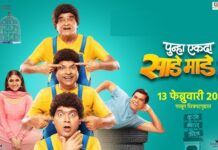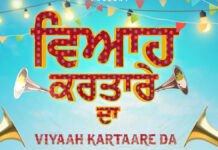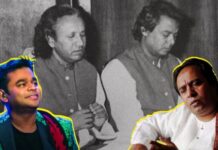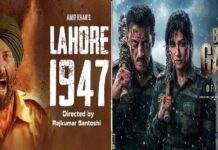Kundalini Entertainment and Karta Entertainment’s Daddy (A) is a biopic on gangster-turned-politician Arun Gawli.
The film traces the journey of Arun Gawli (Arjun Rampal). As a young man, Arun Gawli’s poverty drives him to the world of crime, first as a petty criminal who then gets involved in murdering people. He soon starts working for Maqsood, also known as Bhai (Farhan Akhtar), but ultimately has a fallout with him and becomes an independent underworld don of Bombay city. His run as a don is blocked with his arrest for the murder of an MLA. Arun Gawli then decides to contest elections – and even wins them. For the people of Dagdi Chawl in Bombay, where he lives and rules, he soon becomes a messiah of sorts and comes to be affectionately referred to as ‘Daddy’.
Arjun Rampal and Ashim Ahluwalia have written the story of underworld don Arun Gawli but have been unable to make him appear like a hero of the masses. As such, the audience’s sympathy never really goes to Gawli who is the hero of the drama. Neither is the story inspiring nor is it so engaging that the viewers would feel entertained. In their quest to make the story as true to reality as possible, the two story writers have written a drama which gives the viewers a feeling of watching a docu-feature rather than a feature film. The duo’s screenplay becomes boring and monotonous after a point of time – and quite early on – because there is not much variation. It is the same killings, revenge, violence and the like. Since one has seen many underworld films in the past too, this film’s screenplay looks no different from that of earlier underworld films. The fact that it is a true-life story of a don who is still alive, hardly adds to the entertainment value for the audience. The screenplay is so replete with violence and murders that women and families will feel repulsed by the proceedings. Perhaps, the weakest point about the screenplay is that the audience does not feel sorry for or sympathetic towards any character when he/she is in trouble or is shot dead. Ritesh Shah’s dialogues are realistic but don’t have the punch one looks for in commercial films.
Arjun Rampal does reasonably well as Arun Gawli. With the aid of prosthetics, he looks quite like Gawli. Aishwarya Rajesh is okay as Gawli’s girlfriend-turned-wife. Nishikant Kamat delivers a nuanced performance in the role of the investigating police officer, Vijaykar Nitin. Farhan Akhtar does a fair job as underworld don Maqsood alias Bhai. Rajesh Shringarpure makes his presence felt as Rama. In the role of Babu, Anand Ingale is effective. Purnanand Wandekar leaves a mark as Vijay. Anupriya Goenka (as Hilda) and Shruti Bapna (as Rani) lend good support. Mir Sarwar (as Samad Khan), Usha Naik (as Arun’s mother), Shrikant Yadav (as Sada), Deepak Damle (as Pamphlet Bandya), Girish Pal (as Sachit), Raj Arjun (as Rafique), Vijay Sanap (as Salim Gurda), Sanjay Vichare (as MLA Mhatre), Sanjay Dadhich (as Papa Gawli), Aadesh Bhardwaj (as Sautya), Vishal Om Prakash (as lawyer), Kamna Singh (as MLA Mhatre’s maid), Saheb Singh (as the bodyguard), Vidhyadhar Joshi (as home minister), Prashant Deshpande (as politician Shinde), Nitin Bhajan (as Rama’s brother, Uma), Hridaynath Rane (as Parasiya), Sonika Barwa (as Rama’s bride) and the rest are adequate.
Ashim Ahluwalia’s direction is average. He has made the film like a documentary rather than as a wholesome entertainer. Neither are his dramatic scenes as impactful as they ought to have been nor are his emotional scenes heart-wrenching enough. Even the mob scenes lack in impact. Sajid-Wajid’s music and background score are not very effective. Lyrics (Prashant Ingole, Danish Sabri and Sajid) are okay. Song picturisations (by Kiran Giri and Santosh Bhangre) are functional. Cinematography (by Jessica Lee Gagné and Pankaj Kumar) is alright but shooting with minimal lights is jarring for the audience as all the scenes look dark and hence the viewers have to strain their eyes to see what’s on the screen. Sham Kaushal’s action and stunt scenes are very gruesome, as they needed to be. Parul Saondh’s production design is very nice. Deepa Bhatia and Navnita Sen Dutta’s editing may be sharp but the frequent flashbacks often get so confusing for the audience that the viewer has to strain his memory to remember who is narrating the past at what stage. In all, there are more than five people narrating about Gawli’s past – all at different points in the drama!
On the whole, Daddy is like a docu-feature which will not hold interest for the audience. It may appeal to a tiny section of the audience in Maharashtra due to its Maharashtrian flavour but in the rest of India, it will flop miserably.




























